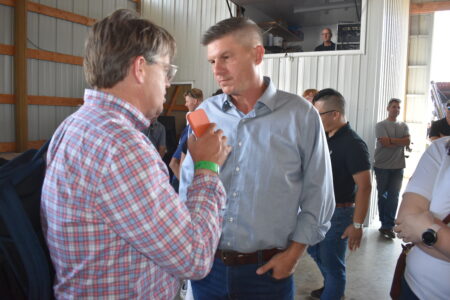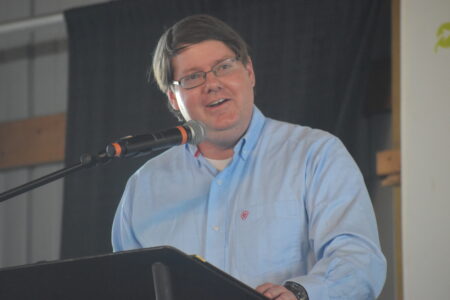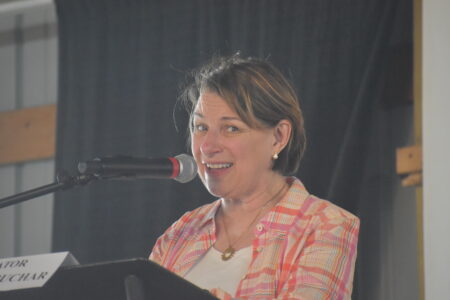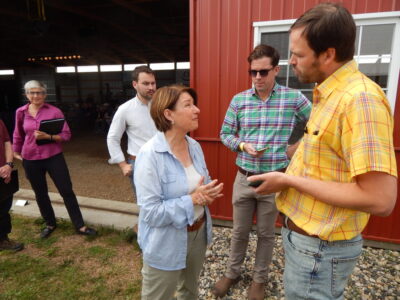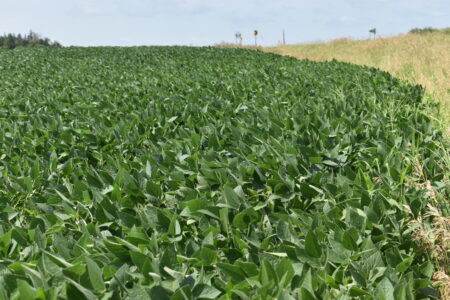U.S. Ag official touts ‘Big Beautiful Bill’
Klobuchar voices concern tariffs drying up markets
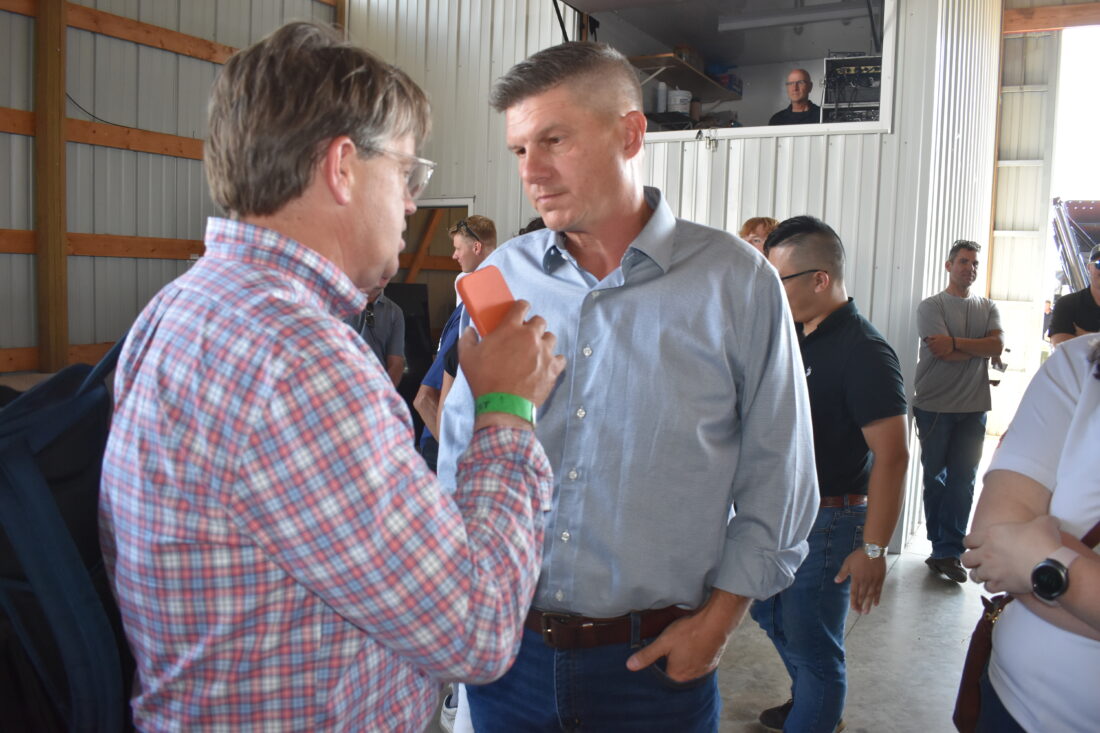
Staff photo by Fritz Busch First District Congressman Brad Finstad of New Ulm is interviewed by political commentator Bloise Olson at a Farmfest Forum Tuesday.
GILFILLAN ESTATE — Federal politicians discussed agricultural policy with passion at times in front of a large Farmfest Forum crowd Tuesday.
Newly appointed U.S. Deputy Secretary of Agriculture Stephen Vaden talked glowingly about the Big Beautiful Bill Act signed into law July 4 containing tax and spending policies defining the core of President Donald Trump’s second-term agenda.
“It has big wins for American agriculture. It modernizes reference prices (benchmark prices set by government agencies or organizations to guide ag producers and stakeholders to help stabilize prices in volatile markets),” he said. “As you know, the cost of modern agriculture has skyrocketed the past few years. USDA reference prices have not kept up with it. This makes the farm safety net something that you can feel underneath you that will protect your operation for years to come. It keeps farmers in the field that might have been forced out.”
He said the other important thing the bill provides is tax certainty for U.S. agriculture.
“For too long, we just regarded our tax policy as a gimmick. We’d pass a tax cut that was favorable for agriculture that would last a few years and go away,” said Vaden. “That’s no way to run a business. You have to look further down the road than that. It also does away with the death tax for more than 99% of the people in this country. For far too long, farmers had to hire accountants, tax professionals and lawyers for the simple desire of passing their farmland on to the next generation. To me, it’s immoral to tax the transfer to farmland that has been in families for generations.”
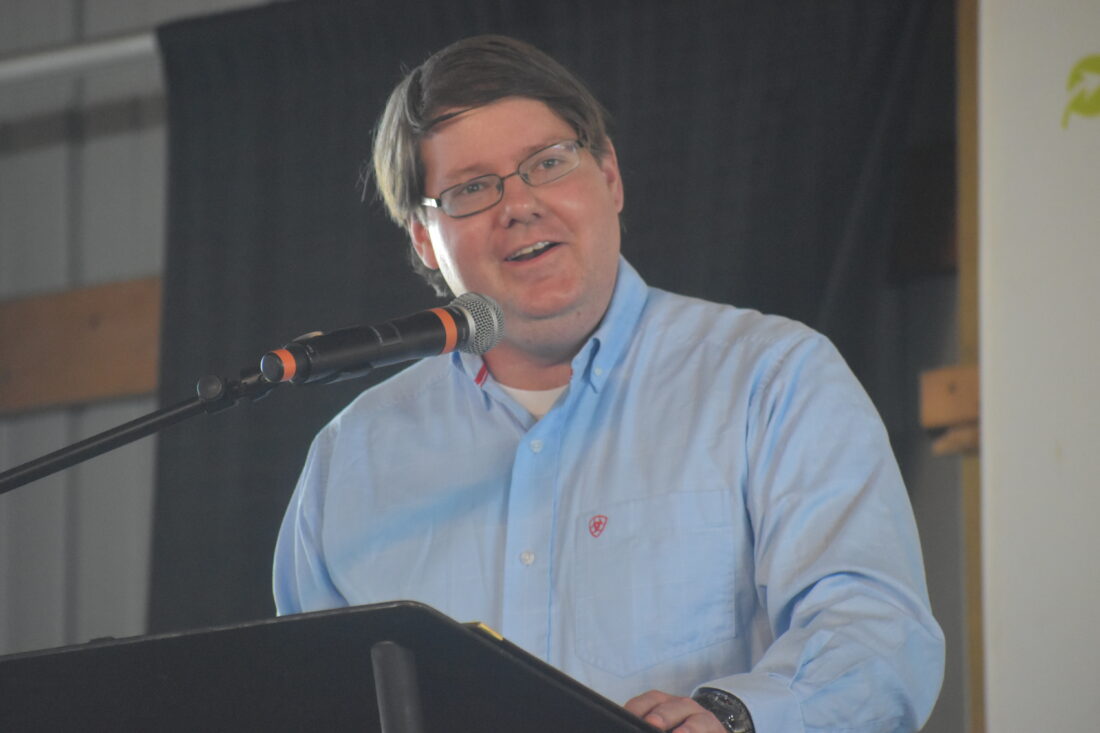
Staff photo by Fritz Busch U.S. Deputy Secretary of Agriculture Stephen Vaden said the recently approved Big, Beautiful Bill Act “keeps farmers in the field” and does away with the death tax for most people passing farmland to the next generation.
He said some people think nobody pays death taxes.
“It was one of the first things I had to do after I buried my father so we could keep his farm,” said Vaden.
“Obviously, the farm economy is not where it should be due in no small part to natural disasters the past few years,” he said. “(Agriculture) Secretary (Brooke) Rollins and I hit the ground running with supplemental disaster relief programs and emergency assistance programs to put money in the hands of farmers for harms they suffered due to the weather in 2023 and 2024 so they can keep their operations going.”
He said producers with losses covered by crop insurance has been paid $1.46 billion to 255,000 farmers across the country since July 10. For the emergency economic assistance program, nearly $8 billion has been paid to more than 571,000 farmers in 49 states.
Vaden said his family members went to the county Farm Service Agency office, filled out a one-page form and sign it. He said funds were direct deposited in his account three days later.
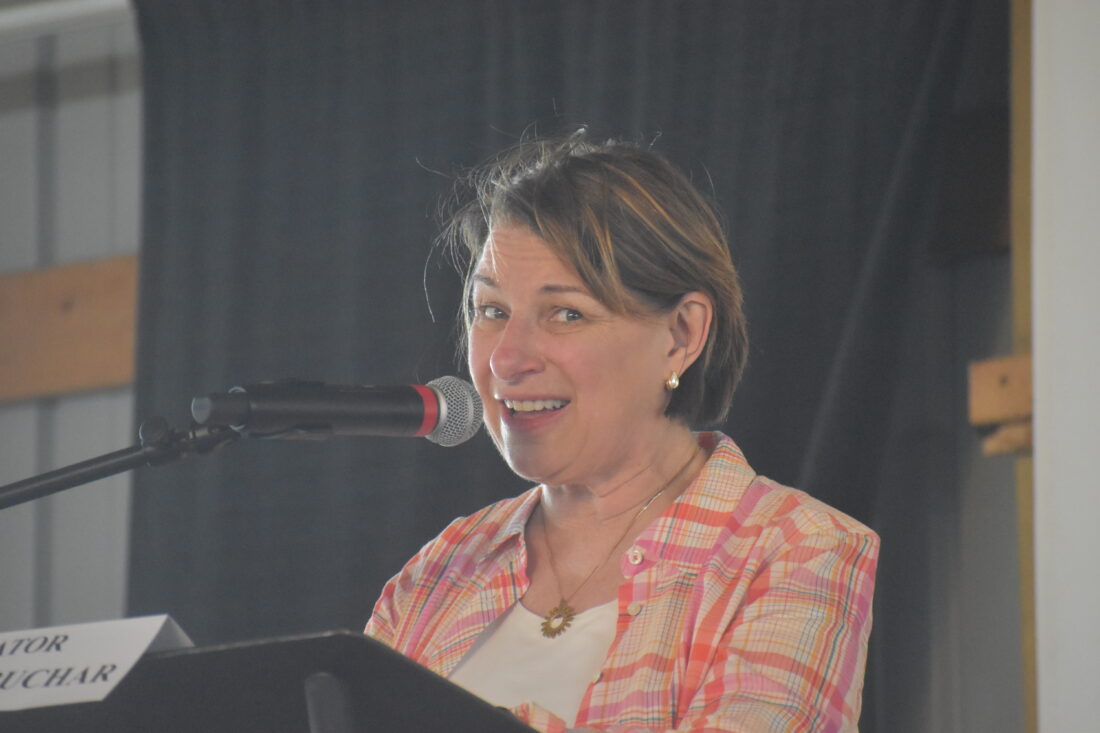
Staff photo by Fritz Busch Speaking at a Farmfest Forum Tuesday, U.S. Senator Amy Klobuchar, R-Minnesota, said she’s still hopeful a Farm Bill will be created in Washington. She voiced concerns about tariffs drying up agriculture markets, losing 15,000 USDA employees and federal SNAP (Supplemental Nutrition Assistance Program) cuts causing an $85 million cost shift to Minnesota counties.
“We need open markets to sell what we grow. For far too long, America’s farmers have suffered from other countries putting unfair trade barriers to keep them from selling their products,” he said. “What you see on Truth Social and Twitter is what is going on behind the scenes. For the first time ever, Japan is buying rice from the United States. The United Kingdom will buy more ethanol and livestock from us. The Trump Administration is dedicated to bringing trade barriers down.”
Eighth District Congressman Pete Stauber said he was very excited to vote the for Big Beautiful Bill.
“No bill is perfect. The welfare to work requirement gives us an opportunity to work together. Small, family farms built this country,” he said. “We’ve secured our borders. Bringing steel production back to this country is about national security. When we move together, we lead the world. It starts with family farms and small communities.”
U.S. Senate Agriculture Committee Ranking Member Amy Klobuchar voiced concerns about tariffs drying up agriculture markets, losing 15,000 USDA employees and SNAP cuts causing an $85 million cost shift to Minnesota counties.
“None of the 10 states with the highest SNAP fraud rates was in the Midwest,” she said.
“We need funding for things like precision agriculture and sustainable aviation fuel that has great potential for Minnesota,” said Klobuchar. “Canada is our biggest trading partner. The Canadians are mad about tariffs and its affecting Minnesota. Let’s keep our spirits up, keep farming and ranching and get a Farm Bill.”
Second District Congresswoman Angie Craig said federal cuts gutted the Farm Bill and Medicaid cuts will hurt rural America.
“First and foremost, we need to put the farm back in the Farm Bill to keep us whole. The agricultural trade deficit we have is hard to believe. It’s bizarre to me we can’t solve this. We need to improve crop insurance. We need to get rid of SNAP waste, fraud and abuse,” said First District Congressman Brad Finstad of New Ulm.
Seventh District Congresswoman Michelle Fischbach said if states decide to shift costs (from federal cuts) to counties, that’s their decision,” she said.
A forum on trade balance and opportunities with Canadian and Mexican officials begins at 10:30 a.m. Wednesday in the Wick building.
- Staff photo by Fritz Busch First District Congressman Brad Finstad of New Ulm is interviewed by political commentator Bloise Olson at a Farmfest Forum Tuesday.
- Staff photo by Fritz Busch U.S. Deputy Secretary of Agriculture Stephen Vaden said the recently approved Big, Beautiful Bill Act “keeps farmers in the field” and does away with the death tax for most people passing farmland to the next generation.
- Staff photo by Fritz Busch Speaking at a Farmfest Forum Tuesday, U.S. Senator Amy Klobuchar, R-Minnesota, said she’s still hopeful a Farm Bill will be created in Washington. She voiced concerns about tariffs drying up agriculture markets, losing 15,000 USDA employees and federal SNAP (Supplemental Nutrition Assistance Program) cuts causing an $85 million cost shift to Minnesota counties.

